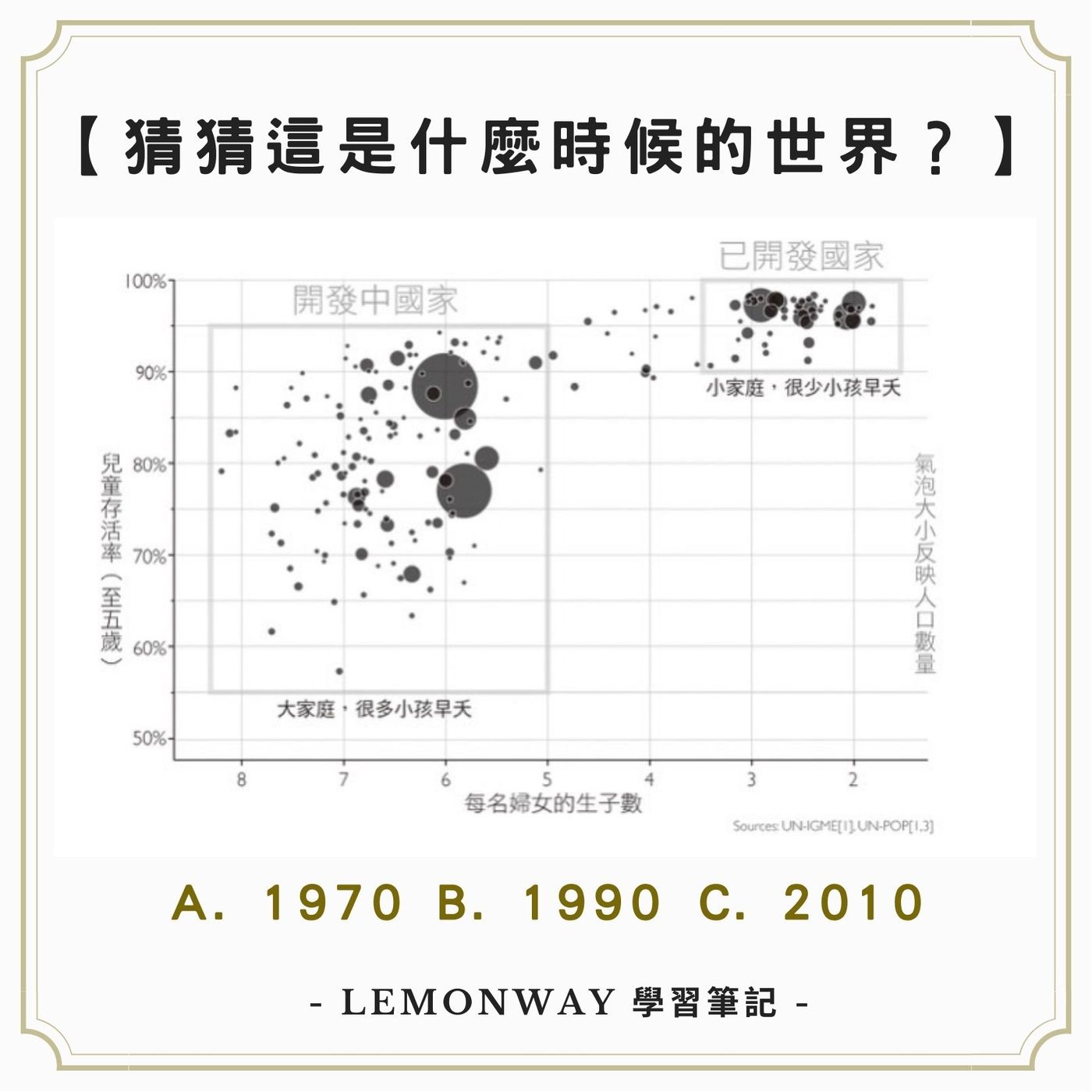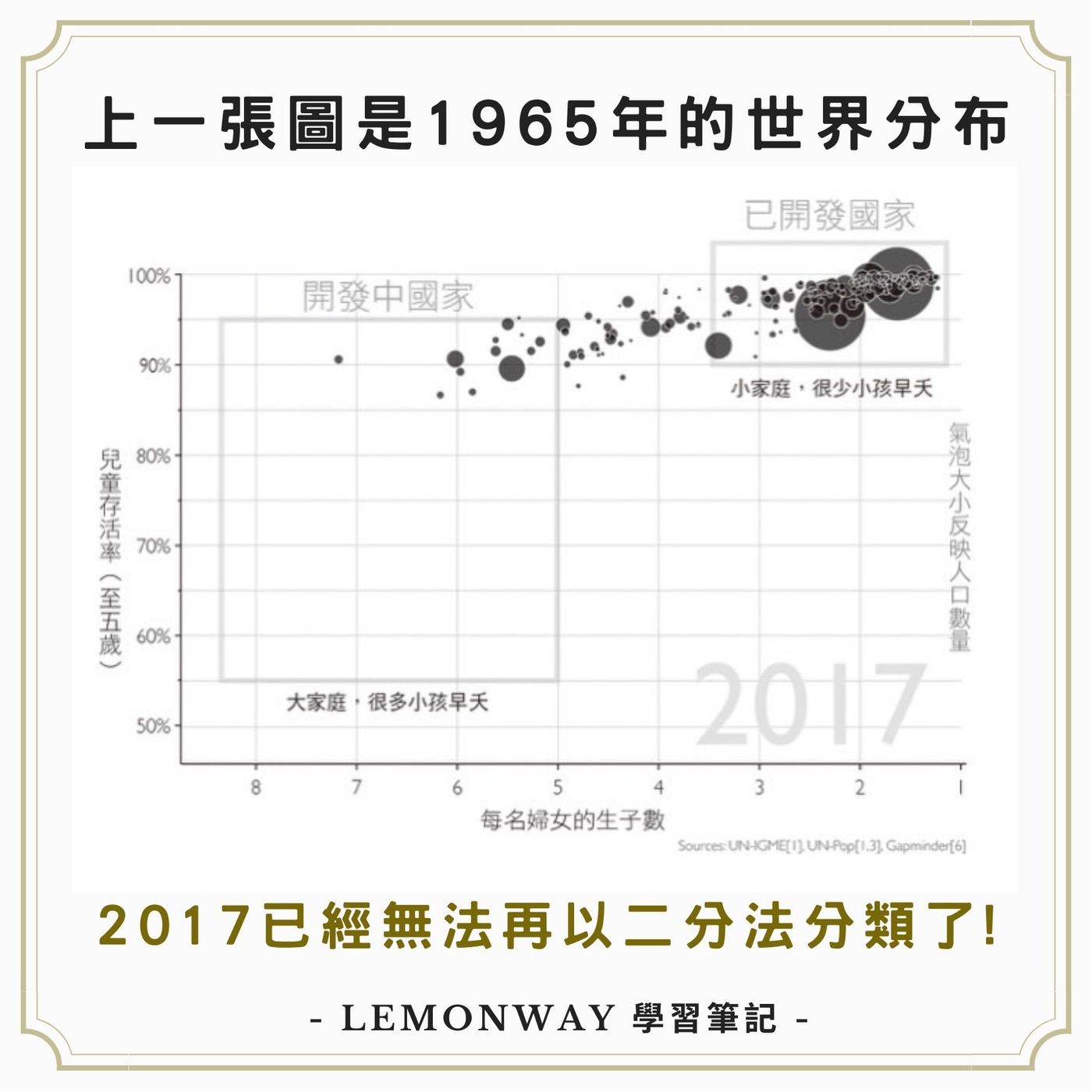
台大化工所 | Podcast 一百種檸檬味 喜歡閱讀、學習新事物。 粉專內容 : 閱讀心得/ 區塊鏈知識/ 解決問題 我的平台:https://linktr.ee/Lemonway_Learning Telegram推薦文章、書籍:https://t.me/lemonwaylearning
[True: The dichotomy we are used to has actually caused a lot of bias? 】
Everyone is accustomed to dividing the world into developing and developed countries, and the dichotomy between the poor and the rich. Do you know that there is actually a big bias?

Take a look at the example above: the intuitive dichotomy we are used to, turns out to be the one from the 1965s . You don't want a doctor to see you with 1965's remedies, right?
The next picture is the same as in 2017, using child survival rate to distinguish, you will find that almost no countries belong to developing countries .

Here's a brainstorm: "What percentage of the world's people live in low-income countries?"
I recently asked a lot of friends, and almost everyone guessed more than 30% or 50%. But the actual answer is... 9%.
[The world can no longer be classified by the poor and the rich]
The world has actually progressed a lot more than we thought. In fact, the United Nations has eliminated this classification of developing and developed, and instead divides it into four levels based on income:
The daily income of the first level is <2 dollars; the second level is between 2-8 dollars, the third level is 8-32 dollars, and the fourth level (Taiwan is) is more than 32 dollars.
The first-level population who are really in extreme poverty currently only accounts for 1 billion, that is, almost all of the remaining 6 billion people have saved money, water, gas, and light bulbs.
That is to say, there is actually a big problem with our long-standing dichotomy: there are many people who actually live in the middle of these two categories, but we are too often misunderstood by what the media and news see.
[Use common sense for dichotomous classification, the possibility of error is high]
And we have so many wrong common sense questions (I just read this book and answered a lot of these common sense questions wrong haha), mainly because human beings are very inclined to think in dichotomies: habits are divided into good and bad, right and wrong, poor and rich, In Taiwan it is blue or green.
Under the media's exaggeration, the confrontation between our perceptions has deepened: the media will only report on the extreme poor and the rich, but will not talk about the people in between, because people don't like to watch them.
Lobby groups are also used to only standing on their own side and talking about the confrontation between the two groups, which makes us more accustomed to the fact that the gap is getting bigger and bigger.
But that was never the case. The truth is usually like a spectrum, it's not just red or violet, there are many gradients in between.
[How to avoid binary intuition bias]
1. From now on don't just divide things into two categories:
In addition to the positive and negative sides of opinions, it is also necessary to consider whether there will be intermediate values. It's like judging things not to rush into right and wrong, but to think more about whether there are other possibilities between right and wrong.
2. Build a normal distribution model in the head:
Everything has the top and bottom layers, but these are a minority, the majority are still in the middle, it’s just that the information we usually come into contact with will only mention the most extreme places, don’t be brainwashed by one-sided single information.
3. Look at more data and verify more:
Many times we get used to the dichotomy because we know too little information. If we knew from now on that when the United Nations switched to using four wage classes to classify the population, we would not make the mistake of thinking that the majority are still very poor.
When you see various opinions put forward by others, don't rush to believe him or oppose him, because both of them may be wrong; only by knowing the truth of the facts can you truly think independently and critically!
- If you want to know more content, welcome to keep track and update!
- Be my appreciative citizen and help me go further by sponsoring a cup of coffee every month. https://liker.land/william53241/civic?utm_source=dashboard&utm_medium=app&utm_campaign=sponsor_link_cta
- Lemonway daily study notes FB fan: https://www.facebook.com/profile.php?id=100055469826072
- Lemonway daily study notes IG fan: https://www.instagram.com/learning_lemonway/
- If you want to cooperate, you can come to me here: william5324144@gmail.com
- Join me to share the blockchain article on Telegram: https://t.me/lemonwaylearning
Like my work?
Don't forget to support or like, so I know you are with me..
Comment…